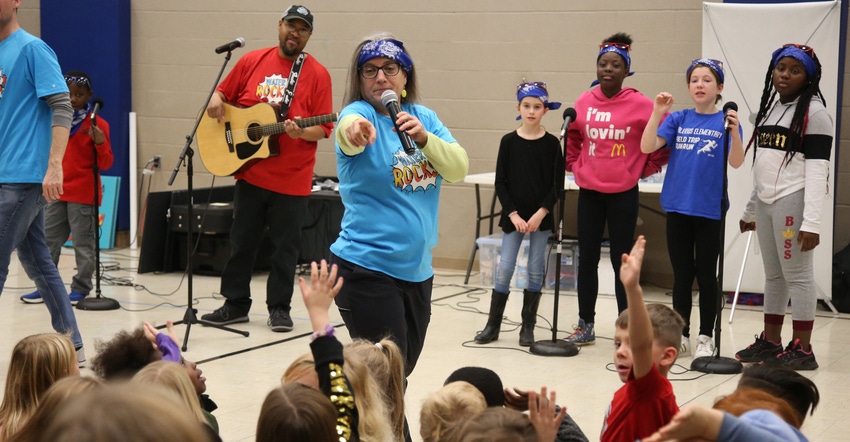March 19, 2021

Since 2016, Water Rocks has enjoyed the support of Iowa’s Des Moines Water Works and Polk County Conservation to provide water quality and conservation educational programming to Polk County schoolchildren. Through this ongoing partnership, Water Rocks has engaged with nearly 25,000 county residents through its award-winning school assembly programs.
Focusing on watershed and water quality awareness, the Water Rocks assemblies employ a combination of live music, interactive teaching, games, skits and dance to engage the interest of students while teaching science-based lessons.
"Assemblies provide us with a chance to introduce vocabulary and energize students to learn more about their environment, water quality, and how they can personally and individually make a difference," says Ann Staudt, Water Rocks director. "We are planting the seeds about where their water comes from and how they can get involved in keeping it clean and safe."
The partnership provides funding to offset the cost to schools for bringing a Water Rocks assembly to 15 campuses each school year. The program has made 69 cost-free visits to date. Due to pandemic-related restrictions preventing in-person assemblies, Water Rocks has continued to serve schools with live-streamed virtual visits until live events become possible again.
Education key
According to Laura Sarcone, customer service supervisor for Des Moines Water Works, support for the Water Rocks programming is one part of the organization's ongoing commitment to educating all consumers about the value of water, water source protection, and how to be a good steward of the land to help ensure we have quality drinking water for the entire community.
"We believe education is the key to protecting our water resources now and in the future," Sarcone says. "We work with partners to educate the community about where water goes, how it becomes contaminated, how it is treated to meet drinking water standards, and ways pollution can be prevented in our community."
As a testament to the impact Water Rocks is having on the area's youth, Sarcone says during a recent tour of the Water Works treatment facility, a college-age student responded to the question, "Who lives in a watershed?" with the “We All Live in a Watershed” song he recalled from a Water Rocks assembly.
Water Rocks assembly programs are designed to engage students in understanding and acting on behalf of shared natural resources. "Water quality improvement begins with awareness about our water, where it comes from, how it can become polluted and what each of us can do to keep it clean," Staudt says. " Water Rocks assemblies engage students physically, intellectually and emotionally to raise awareness. We hope our efforts will continuously raise the bar of awareness about water quality over the long term."
Richard Leopold, Polk County Conservation director, says this partnership is a great example of organizations bringing strengths to the table to achieve shared education goals with maximum impact. Polk County Conservation serves some 500,000 residents, has five naturalists on staff, and operates a robust youth education and outreach program across the county. The Water Rocks assemblies contribute to the overall missions of the organization.
"Our three primary missions are outdoor recreation, environmental education and conservation of our natural resources," Leopold says. "The Water Rocks program aligns with all three elements and complements the youth education programming we deliver with our staff."
Sarcone echoes the value of youth education about water, stating that educating Iowa's youth provides hope for a future where they will apply what they've learned to help make Iowa a better place to work and play. "Water really connects us all, rural and urban dwellers," she says. "We all live downstream from someone. What we do on the land really affects the quality of water for everyone in Iowa and downstream."
Going virtual
Water Rocks assemblies have been curtailed by the pandemic, but the restrictions have led to innovation in online and virtual programs. Scaled down from hundreds of students singing and dancing in a gymnasium to a much smaller classroom-size streaming experience, the program has taken on some new characteristics.
"The learning experience has changed from a large dance party to a more concentrated experience, using tools and techniques which engage the students' senses in a more intimate and empowering interactive setting," Staudt says. "It's a different experience, built as a fast-paced hybrid news broadcast-variety show, with interactive trivia and virtual scavenger hunts interwoven. But the teacher and student feedback has been very positive. We see this year of change as an expansion of our portfolio and are eager to continue serving students in as many ways as we can."
Looking forward to spring, summer and the next school year, Staudt is hopeful that the Water Rocks teams will get back into the field, starting with outdoor classroom visits to schools and eventually some fun roof-raising assemblies at Polk County schools and beyond.
Ripley is a conservation outreach specialist with Iowa Learning Farms and Water Rocks.
About the Author(s)
You May Also Like




